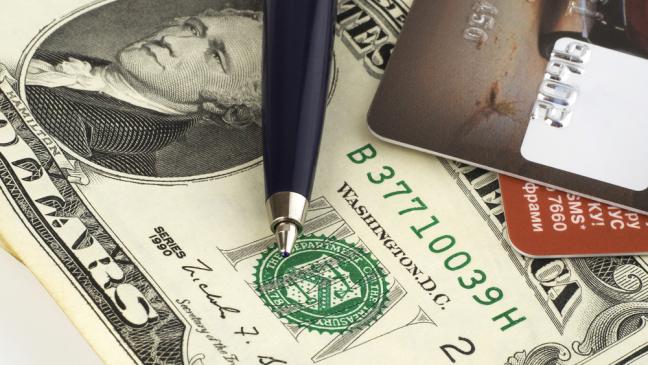Editor 's note: This story has been updated. Please see our final update at the bottom of this previously reported story .
In Soviet Russia , banks pay customers' bills. Or, at least, one might.
An interesting case has surfaced in Voronezh, Russia, where a man is suing a bank for more than 24 million Russian rubles (about $727,000) in compensation over a handcrafted document that was signed and recognized by the bank.
DmitryAgarkov said that in 2008 he received a letter from Tinkoff Credit Systems in his mailbox. It was a credit card application form with an agreement contract enclosed, much like the applications Americans receive daily from Visa ( V ), Mastercard ( MA ), American Express ( AXP ), or Discover ( DFS ).Agarkov filled in the form and returned the signed application, though what he sent back was not exactly the same document the bank had sent him.

A promotional image from Tinkoff Credit Systems' website .
Agarkov changed some parts for his own benefit -- most notably, the small print. He opted in for a 0% APR and no fees, and added that the customer "is not obliged to pay any fees and charges imposed by bank tariffs." He also changed the URL of the site where the terms and conditions were published from www.tcsbank.ru to tcsbank .at.ua . Additionally, he added a special clause that would protect him should the bank break the agreement in a unilateral manner. For each unilateral change in the terms provided in the agreement, the bank would be asked to pay the customer (Agarkov ) 3 million rubles (about $91,000), or a cancellation fee of 6 million rubles ($182,000).
Agarkov then sent his updated agreement to the bank, and shortly thereafter received the bank's signed and certified copy, as well as a credit card.
However, after two years of active use, the bank decided to terminate Mr. Agarkov's credit card in 2010 because he was late paying the minimum required amounts. In 2012, the bank suedAgarkov for 45,000 roubles ($1,363) - an amount that included the remaining balance, fees, and late payment charges. The court decided that the agreement Agarkovcrafted was valid, and requiredAgarkov to settle only his balance of 19,000 rubles ($575).

DmitryAgarkov , the customer who rewrote the rules for his own credit card. Photo republished with permission from RIA Voronezh .
Despite the apparent victory,Agarkov fought back: On August 1, the Kominternovsky District Court of Voronezh launched hearings about Agarkov 's countersuit against the bank . As Tinkoff Credit Systems had not honored eight clauses in the agreement,Agarkov now wants the bank to pay amends of 24 million rubles ($727,000) total. The law firmKonsultant , which is representingAgarkov , says that the bank's decision to terminate the agreement cannot be lawful because his client was not paid 6 million rubles, as per terms of the amended agreement.
The bank has so far said that the case was related to "a nonrecurrent technical issue," and it is willing to have its day in court. The next hearing will be held in September.
UPDATE:
The dispute between Agarkov and Tinkoff Credit Systems escalated when the bank's chairman, Oleg Tinkov, took to Twitter to respond to media interest in the case. (See: Russian Bank Chairman Comments on the Fine Print Case: 'Nobody Will Win Anything From Us.' )
Then, on August 14, both sides announced a settlement on undisclosed terms.
"The conflict is counterproductive, so we agreed to settle it by withdrawing our mutual complaints," said Oliver Hughes, president of Tinkoff Credit Systems.
"This started as a joke in 2008... but the joke has gone too far," said Agarkov.
"Of course I won't recommend other people do what I did. Before you opt in for credit, you must think multiple times and carefully study your bank's terms. But if you agree, you'll have to stick to it."
The views and opinions expressed herein are the views and opinions of the author and do not necessarily reflect those of Nasdaq, Inc.
The views and opinions expressed herein are the views and opinions of the author and do not necessarily reflect those of Nasdaq, Inc.
 Credit: Shutterstock photo
Credit: Shutterstock photo
